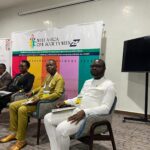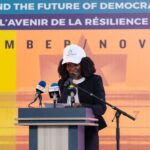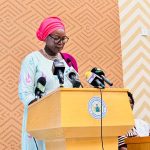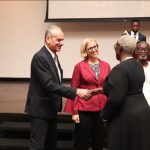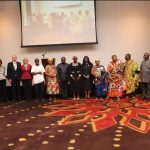
Dr. Joseph Kobla Wemakor, Executive Director of Human Rights Reporters Ghana (HRRG), has called on civil society organizations (CSOs) to deepen collaboration and unity to reinforce peace, security, and justice across Africa.
He made this appeal as a panelist at the 3rd West Africa Civil Society Week (WACS Week 2025), held from 19–20 November at The Palms by Eagle Hotel, Accra.
The two-day event featured 15 interactive sessions and two plenaries, bringing together over 300 civil society actors, peacebuilders, human rights advocates, and youth leaders from more than 10 West African countries. The program provided multiple platforms for participants to discuss civic space, governance, peace, and security challenges across the region.
Dr. Wemakor Speaks on Peace, Security, and Justice Imperatives Dr. Wemakor participated in Session 3(b) on “Peace, Security and Justice Imperatives”, hosted by the West Africa Network for Peacebuilding (WANEP) and chaired by Dr. Vincent Azumah, Head of Monitoring and Evaluation at WANEP.
Addressing a room full of peacebuilders, civic activists, and regional policymakers, Dr. Wemakor highlighted structural challenges facing Africa-led peace and counterterrorism operations, citing poor coordination, limited resources, and weak leadership as key obstacles. He urged CSOs to rally support for one another, collaborate, and unite to complement governments and other stakeholders in achieving sustainable peace, security, and justice in Africa.
Evidence-Based Call to Action
Dr. Wemakor drew on findings from the 50-page report, Mapping Civil Society Engagement in Africa-Led Peace Operations, published by Spaces for Change (S4C).
The research maps CSO contributions across conflict-affected regions, including counterterrorism initiatives, peacebuilding, community engagement, capacity-building, and humanitarian actions.
He dedicated the report to all civil society actors, policymakers, government institutions, and the public, urging them to read and be informed.
The findings underscore gaps in civil society participation at the policy level and highlight the urgent need for CSOs to be meaningfully included in the design and implementation of security initiatives.
Dr. Wemakor also framed Africa’s leadership challenges as structural rather than solely political, advocating for bottom-up sensitization to transform leadership practices across civic, governmental, and intergovernmental institutions.
Expert Panel Discussion Joining Dr. Wemakor on the panel were:
- Nansata Yakubu, Director, West Africa Programme, Conciliation Resources
- Kop’ep K. Dabugat, Governance, Peace, and Security Expert, Nigeria
- EI Moctar Cisse, President, Collectif Cri du Coeur (CCC), Mali
- Joy Anima Debrah, Senior Public Education Officer, Commission on Human Rights and Administrative Justice (CHRAJ).

The panel engaged in a robust discussion on the importance of CSO involvement in peace operations and how civil society can reinforce accountability, justice, and preventive action in fragile contexts.
Democracy Under Threat: ECOWAS and Regional Voices
The urgency of civil society’s role was emphasized by Ambassador Abdel-Fatau Musah (PhD), ECOWAS Commissioner for Political Affairs, Peace and Security, who warned at the opening plenary that democracy in West Africa is under threat due to rising insecurity, governance failures, and shrinking civic space.
Other notable voices included:
- E. Mohamed Ibn Chambas, AU High Representative for Silencing the Guns, advocating for democracy that delivers social protection beyond elections
- Nana Afadzinu, Executive Director of WACSI, calling for value-driven civil society action, transparency, and sustainable funding
- Sola Sam-Adeniyi, Spaces for Change, highlighting threats like violent extremism and suppression of freedoms, and emphasizing local solutions and capacity building
- Onyinye Onyemobi, Ford Foundation, noting that hope is the oxygen of democracy
- Nana Oye Bampoe Addo, Deputy Chief of Staff to Ghana’s President, urging ethical engagement, community-centered peacebuilding, and multi-stakeholder partnerships
The closing plenary reaffirmed that an empowered civil society is critical to ensuring resilient democracy and peace across West Africa.
Key Takeaways from WACS Week 2025
- Strengthen local accountability and rebuild trust in grassroots communities
- Adopt sustainable funding models and deepen institutional capacity
- Elevate youth and women’s participation in civic processes
- Use technology responsibly to expand civic space and accountability
- Promote regional cooperation for judicial reform, governance, and anti-corruption
These takeaways echo Dr. Wemakor’s central message: civil society is not just a partner but a critical anchor for peace and democratic resilience in Africa.

About WACS Week
The West Africa Civil Society Week (WACS Week) is an annual gathering that assesses the health of civic space in the region while charting practical pathways for civil society effectiveness and democratic sustainability.
The 2025 edition, co-hosted by WACSI, Spaces for Change, and the Civil Society Resource Hub, with support from the Ford Foundation, featured 15 sessions and two plenaries, creating spaces for discussion, networking, and cross-regional learning.


